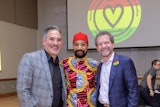Several years ago I reviewed Breaking Bread by bell hooks and Dr.
Cornel West for National Public Radio. I stated in my commentary that
the conversation or dialogue between the two public intellectuals was
filled with nourishment and inspiration. I felt their views provided us
with a reason for hope, in a constantly changing world. Now a few years
later, the popular West – with the help of Kelvin Sealey – has given us
a series of exchanges with nine interesting individuals.
Upon first picking up Restoring Hope, one might jump to the
conclusion that West is simply adding another book to his impressive
resume – or worsen, this is a book released for quick cash. Publishers
have a habit of doing this. It’s similar to the recording industry
exploiting singers and musicians long after people have stopped dancing
to their music.
Mention the name Cornel West and one is talking about the
“celebrity” intellectual. The type of person who might be more
comfortable on television than in the library.
West, however, is a man of substance as well as style. He is also a
good listener, and Restoring Hope finds him in the company of Harry
Belafonte, Bill Bradley, Charlayne Hunter-Gault, Reverend James Forbes,
Jr., Reverend James M. Washington, Wynton Marsalis, Patricia Williams,
Haki Madhubuti and Maya Angelou.
The best way to “swim” in this book is to get your feet wet by
reading the conversation West has with the person you most admire. For
me, it was no contest. As a poet and activist, no living artist
impressed me more than Harry Belafonte. My $25 would purchase this book
just for his words alone.
Belafonte talks about the influence of Paul Robeson, Marcus Garvey
and Haile Selassie on his life. The Robeson connection is one which
appears again in the conversation West conducts with Haki Madhubuti. If
there is a recurring theme throughout the book, it is the
acknowledgement of the need for mentors, respect for elders, and the
appreciation of African American history and culture. As cultural
workers, individuals such as Belafonte and Haki Madhubuti serve as a
barometer of where our society is heading.
If there is a cause for despair and an absence of hope, it is due to
what Belafonte sees as the considerable amount of negativity which
saturates Black culture today and which is exploited by monopoly
capital. Our economic condition has determined the spiritual as well as
material conditions of our lives. For Belafonte, the culture of a
people is the soul of a people, expressing their hopes and aspirations.
Cornel West has often spoken about the need for what he defines as
hope. One can view this as either a concern for the future or simply
the need to determine the various possibilities which confront us. It
is not an easy task. It is good that West talks to others and not just
himself.
There is a slight groping by West throughout the book, an attempt to
probe others for insight and understanding. At times, one wonders if he
is simply a preacher interacting with a congregation of thinkers. These
conversations seem like an example of call and response.
The law professor Patricia Williams tells West that “hope is a force that ties people together in an almost theological sense.”
In his exchange with Maya Angelou, West links the concept of hope to
the principles of courage and one’s strength to tell the truth about
America. Angelou responds to West by equating hope with love. Here we
find both of them reaching a level of understanding on which such
figures as Martin Luther King Jr. and Howard Thurman were known to
ground their philosophy and actions.
It is good that Angelou’s conversation is the last entry in
Restoring Hope. It encourages one to ponder the remarks made by the
other contributors.
It is Wynton Marsalis who makes the remark that “civilization is
effort” and it is uplifting to find people like Haki Madhubuti talking
about institution building, and Charlayne Hunter-Gault mentioning the
need to give young Black people protective armor in order to guarantee
their survival.
I was surprised to find a conversation with Senator Bill Bradley
included in Restoring Hope. Here we find West opening “the door of his
church” to include everyone in the important dialogue on race. Although
Black people must determine their own future, the future is not just a
Black thing. It belongs to all of us.
Senator Bradley talks about transformation and the coming together
of people. If this is done, then we will find that hope resides in our
own spirituality. We are reminded of this by the ministers James Forbes
and James Washington.
Restoring Hope is a collection of conversations that were recorded
in New York, Chicago, and Cambridge, Massachusetts. The book is better
than talk radio. One should listen to the men and women in this book.
They are all teachers and mentors – people of the heart. They continue
to point us in the direction of a bright and shining star.
Dr. E. Ethelbert Miller is the director of the African American Resource Center at Howard University.
COPYRIGHT 1997 Cox, Matthews & Associates
© Copyright 2005 by DiverseEducation.com















